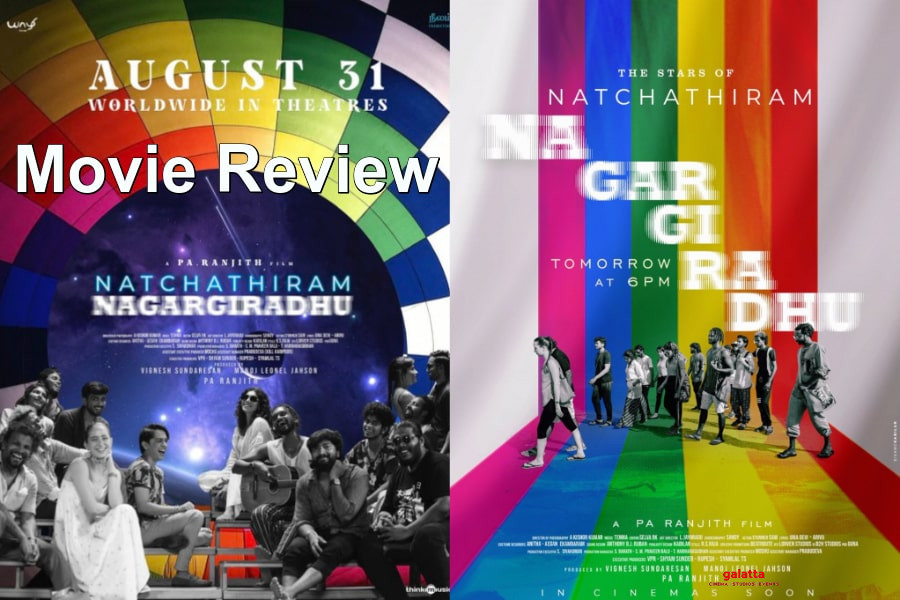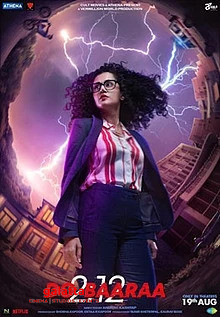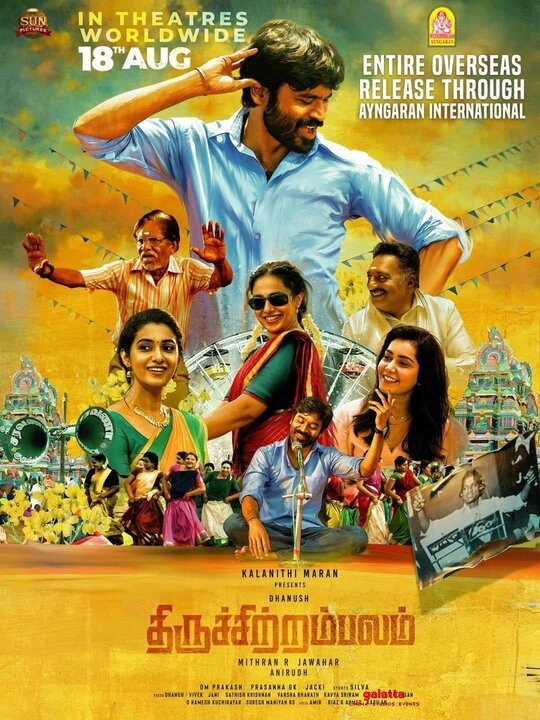Natchathiram Nagargirathu Movie Review (2022)
Pa Ranjith's 'Natchathiram Nagargiradhu', with Dushara Vijayan, Kalidas Jayaram and Kalaiyarasan, is perfectly in sync with this filmmaker's politics of inclusivity

Natchathiram Nagargirathu Movie Cast & Crew
Pa Ranjith's cinema has always been about breaking the status quo. In Natchathiram Nagargiradhu, he breaks the boundaries between theatre and cinema. It takes a while to settle into this film's rhythms – in a way, it is like watching filmed street theatre. But this experimentation in terms of form is perfectly in sync with this filmmaker's politics of inclusivity. If everyone should be considered equal, then why should we discriminate between art forms? If a Dalit (Dushara Vijayan) can be in love with someone from a dominant caste (Kalidas Jayaram), then why can't the polemics of street theatre be absorbed into cinema? In other words, why should cinema always be "naturalistic"? Ranjith has always been a terrific filmmaker (remember the sequence around Anbu's death in Madras?), but too often – and perhaps, inevitably – his politics has always been noticed more, praised more. Natchathiram Nagargiradhu should change that forever. It is his most daring experiment in terms of form.
The film sets out its agenda in the opening scene, where the Dushara and Kalidas characters are in bed. They've made love. He wants to sleep. She is wide awake. A quarrel ensues, but it is not your usual "couples quarrel". His music is Nina Simone – a black artist. Hers is Ilayaraja – a Dalit artist. (The song she sings, En vaaniley orey vennila, contains a reference to this film's title. The lyrics that follow have the phrase "...kavidhai tharagai… ooorvalam…" It's a procession of stars – i.e., natchathiram nagargiradhu.) She wonders about the significance of marriage. She mocks his dislike of Ilayaraja, who ruled the world of south Indian film music for an entire decade, erasing all caste barriers at least in his art. Put simply, she likes to provoke him. He is content with the status quo. If Pa Ranjith were a woman, he'd be this character, who is accused – as Ranjith has often been – as having "caste budhi", or always thinking about caste.
Her name is Rene, and it is an assumed name – taken from one of her favourite books. And slowly, we see that her entire persona, her social identity, is "assumed", created from scratch, in order to erase the oppressed person she once was. This is technically an ensemble film, but Rene is its centre, its beating heart, its protagonist. This is the first time Ranjith is working with a female protagonist, and he (with Dushara Vijayan) does wonders with the character. In comparison, almost everyone else comes off weaker. This could also be due to the fact that not everyone in the large cast registers strongly. (The focus is on Dushara, Kalidas and Kalaiyarasan.) The premise is that a play is being staged, and the subject is love: rather, the politics behind love, which leads to honour killings and the accusations that Dalits pretend to love dominant-caste women for money and so forth.
The Kalaiyarasan character, named Arjun, is the stand-in for our conservative society. You could call him a "city bumpkin". He wants to be in the movies. He is shocked by the casual inclusiveness in this bunch of actors: the gay, lesbian and transgender couples do not get much screen time, but they make the point that love knows no gender. He is shocked when he is handed a broom and asked to clean the theatre with the others. If everyone is equal, then every job – menial or otherwise – should be seen as equal. All languages are equal: we have people speaking Hindi, Tamil, English, Malayalam and even French. Similarly, Tenma's first song, 'Rangarattinam', demolishes hierarchies. The song mixes western pop and gaana – though my favourite songs from the album are 'Paruvame' and 'Perinba Kadhal'.
There are two issues I had with Natchathiram Nagargiradhu. One is the (perhaps deliberate) claustrophobia. Everything – every thought, every scene, every deed – is about love or marriage or sex. I would have liked a few detours into someone's profession, for example, or any of the million other things that make up our lives. The other complaint is that some points become repetitive: both spoken and staged. The portions that work best are the ones where the personal is mixed with the political, while the other scenes come off like a panel discussion. But then again, this film is not "naturalistic", and so the dialogue is not meant to be invisible. It is meant to be in your face, in extreme focus. And this is part of the groundbreaking form. Unlike Parasakthi, for instance, the dialogue is not folded into a "story". Instead, the story (such as it is) forms around these dialogues.
There's so much to talk about with respect to this film's form. Take the writing. Rene always talks about stars – and she is the only one one (at least till the last scene) who talks about stars. (Sample line: love is like a moving star.) Take the cinematography (A Kishor Kumar). The slight handheld feel of the camera make us – the audience, the society – a part of the proceedings, and the use of red for Rene's scenes and clothes sets her apart from the rest. Take the editing (Selva RK). In the first half half, one couple is shown via split screens, while another couple's moments are transitioned through fades to black – and in the second half, moments of the latter couple are shown through dissolves. Or take the real-life footage of hate crimes, woven into the narrative, as a dirge (oppari) erupts from one of the many non-theatre people asked about love. This is the reality behind the play.
Light, especially, is used beautifully and symbolically. In one scene, as Rene leads a character up the stairs, the brightness makes it seem like they are climbing the stairway to heaven. In another scene, a Buddha mural painted over an open door lets in a flood of light. As always, there is plenty to pick apart and "decode", as the YouTubers say. The sound, too, incorporates meows and roars to indicate small and big cats. These creatures become symbolic representations of caste. And almost as if to break free of all this heaviness, Ranjith writes a superb stretch for Kalaiyarasan when he visits his home. We are still talking about caste, but the scenarios and the lines are hilarious. Kalaiyarasan really comes into his own in these portions.
Does the play go off as planned? If it does, it means art is bigger than society. If it doesn't, it means the struggle will have to continue. How do you end a film on a note that's both realistic and hopeful and fantastical and containing a heart as big as the galaxy? Natchathiram Nagargiradhu pulls it off. Walking out, I wondered why Ranjith didn't send this film to festivals. (Or maybe he did.) Despite the mainstream conventions - the Ilayaraja songs, the romances – this is very much an experimental film. To reiterate the Parasakthi example above, the success of Natchathiram Nagargiradhu is that it is not a story that contains ideas. It's the ideas that make up the story. The film goes beyond categories of "good" or "okay" or "bad". It's always… interesting, and that's what's important.
About Author

Baradwaj Rangan
National Award-winning film critic Baradwaj Rangan, former deputy editor of The Hindu and senior editor of Film Companion, has carved a niche for himself over the years as a powerful voice in cinema, especially the Tamil film industry, with his reviews of films. While he was pursuing his chemical engineering degree, he was fascinated with the writing and analysis of world cinema by American critics. Baradwaj completed his Master’s degree in Advertising and Public Relations through scholarship. His first review was for the Hindi film Dum, published on January 30, 2003, in the Madras Plus supplement of The Economic Times. He then started critiquing Tamil films in 2014 and did a review on the film Subramaniapuram, while also debuting as a writer in the unreleased rom-com Kadhal 2 Kalyanam. Furthermore, Baradwaj has authored two books - Conversations with Mani Ratnam, 2012, and A Journey Through Indian Cinema, 2014. In 2017, he joined Film Companion South and continued to show his prowess in critiquing for the next five years garnering a wide viewership and a fan following of his own before announcing to be a part of Galatta Media in March 2022.



















